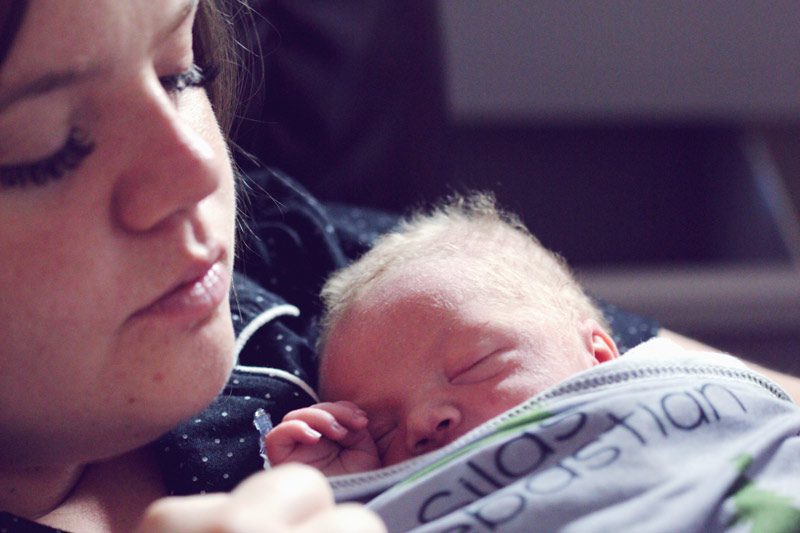Pregnancy is a beautiful process, but it comes with its hardships and problems. Many people think that giving birth puts an end to the struggles, and it all becomes sunshine and roses afterward. However, it is followed by the postpartum period, which sometimes can be even more difficult than pregnancy itself. According to World Health Organization, the postpartum period “is a critical phase in the lives of mothers and newborn babies. Major changes occur during this period which determines the well-being of mothers and newborns. Yet, this is the most neglected time for the provision of quality services.”
Your Mental Health Can Be Affected
Many new mothers expect physical changes that follow the birth. However, the potential changes in mental health are often overlooked. It is important to understand that your mental health can also be affected, just like your physical health.
According to research, as many as 80% of women experience postpartum blues after delivery, making it the most prevalent postpartum phenomenon. Postpartum “baby blues” is not a disorder. It is an entirely normal and expected postpartum occurrence. This condition is characterized by moodiness, sadness, and mood swings that mothers experience in the first two weeks after giving birth. The baby blues usually last up to two weeks and rarely cause bigger problems.
More concerning are postpartum disorders, which come in two main types. The first is postpartum depression, which affects up to 15% of mothers. It is very similar to major depressive disorder (MDD) and is mainly characterized by restlessness and loss of interest in enjoyable activities.
The main risk factors for postpartum depression are socioeconomic status (SES) and age. According to a study published in Women’s Health Issues, “SES factors including low education, low income, being unmarried, and being unemployed increased the risk of developing postpartum depressive symptoms.”
The second type is postpartum psychosis, which affects only 0.1 – 0.2% of new mothers. It is a severe condition, which shows itself in psychotic episodes. Most mothers who develop it have been diagnosed with other psychiatric disorders before or during pregnancy. That is why it is important to seek help if you feel any general distress or anxiety. Here are common warning signs and symptoms that you should not ignore.
Causes of Postpartum Problems
There are three main causes of postpartum problems. Some are linked to more serious disorders, while others are the reason for general distress and sadness after giving birth.
Hormonal Changes
Pregnancy causes slow but steady hormonal changes in the body that are necessary to deliver a healthy baby. The delivery itself usually shocks the body and the endocrine system, causing rapid changes in hormone levels. Those rapid changes are what might cause baby blues and postpartum disorders.
For example, during pregnancy, a form of estrogen called estradiol increases by 100-fold but rapidly decreases just after delivery. This hormone is partially responsible for the reduced breakdown and increased synthesis of the neurotransmitter serotonin. One of the main properties of serotonin is that it works as a mood stabilizer. Such a rapid shift in serotonergic activity might cause postpartum disorders and mood swings.
Other Physical Changes
Delivery is very physically taxing. The baby has to go through the birth canal and, in the process, stretches the opening. The vagina takes a toll and will likely change in appearance. Following the birth, it might look and feel different. It can become wider, drier, and sore. Such aftermath is normal and to be expected. Usually, changes like that can be mitigated by various exercises, but in extreme situations, surgery may be preferable or even necessary.
Lifestyle Changes
Women have to make numerous sacrifices during pregnancy, but the number of sacrifices only increases after delivery. Now you can forget full nights of sleep and a life without responsibilities. Such a lifestyle change can cause general distress and anxiety. However, it is normal to feel that way after significant changes in one’s life.
You Are Not Alone
Regardless of what kind of problems you experience, there is a specialist that can help you. If you feel any sort of distress or have questions, do not hesitate to reach out to an expert.
If you notice profound changes in your mental wellbeing following birth, a psychologist or psychiatrist can help you. Therapy sessions with a psychologist can help maintain your mental health and deal with arising problems. If you are at risk for postpartum depression or psychosis, a psychiatrist might choose to prescribe medications.
It’s important to see a doctor if symptoms don’t go away in approximately two weeks or you notice they are worse. If it’s hard for you to take care of your baby and complete everyday tasks, seek help from your loved ones and try to take some time for yourself.
If vaginal or other bodily issues bother you, consult a doctor about your options to solve the problem. Keeping yourself comfortable is the most important thing to do so it can help you feel confident, comfortable and continue with your regular activities soon after childbirth.
You Will Be Fine
The postpartum period is as, if not more, difficult than pregnancy itself, and now you know what to expect from it. From baby blues to postpartum depression, there are many challenges that might strain your early motherhood. However, now you also know that you are not alone, and there are many qualified people who can help you to deal with any problems. From mental health specialists to medical doctors, they will help you out.
If you or someone you know experiences mental health issues, it is important to seek help from a qualified professional. Our Resource Specialist can help you find expert mental health resources to recover in your community. Contact us now for more information on this free service to our users.
About the Author: Arijus Špokas is a psychology graduate who is using his academic knowledge to write psychology-related articles. His first encounter with the science of psychology happened at the age of 7 when he found an ‘Intro to Psychology’ textbook in the attic. Since reading that, he’s been hooked on psychology. When Arijus isn’t reading or writing, he loves to cycle and hike.” Currently, Arijus is a part of the communication team at Labiaplasty NYC Gynecology Clinic.
Photo by Sharon McCutcheon on Unsplash
The opinions and views expressed in any guest blog post do not necessarily reflect those of www.rtor.org or its sponsor, Laurel House, Inc. The author and www.rtor.org have no affiliations with any products or services mentioned in the article or linked to therein. Guest Authors may have affiliations to products mentioned or linked to in their author bios.
Recommended for You
- The Intersection of LGBTQ+ Identity and Mental Health - December 9, 2024
- What Are the Signs of Self-Harm? A Comprehensive Guide - December 5, 2024
- People-Pleasing: Definition, Examples, and What You Can Do Instead - December 2, 2024





